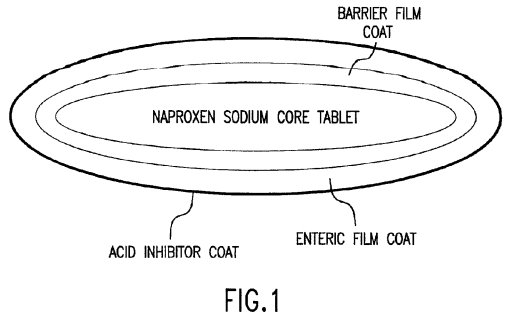 On Tuesday, June 27th, Irish biopharmaceutical firm Horizon Pharma (NASDAQ:HZNP) announced that two of its patents covering Vimovo, a pain relief treatment for arthritis patients, had their validity upheld in a patent infringement case filed in the District of New Jersey (D.N.J.). The decision allows Horizon Pharma to move forward with its argument that at least one of the two upheld patents would be infringed by generic versions of Vimovo being developed by Indian drugmakers Lupin Limited (NSE:LUPIN) and Dr. Reddy’s Laboratories (NYSE:RDY) as well as American generic drugmaker Mylan (NASDAQ:MYL).
On Tuesday, June 27th, Irish biopharmaceutical firm Horizon Pharma (NASDAQ:HZNP) announced that two of its patents covering Vimovo, a pain relief treatment for arthritis patients, had their validity upheld in a patent infringement case filed in the District of New Jersey (D.N.J.). The decision allows Horizon Pharma to move forward with its argument that at least one of the two upheld patents would be infringed by generic versions of Vimovo being developed by Indian drugmakers Lupin Limited (NSE:LUPIN) and Dr. Reddy’s Laboratories (NYSE:RDY) as well as American generic drugmaker Mylan (NASDAQ:MYL).
The two Horizon Pharma patents which have been upheld in district court are:
- U.S. Patent No. 6926907, titled Pharmaceutical Compositions for the Coordinated Delivery of NSAIDs. It protects a pain relief pharmaceutical composition for oral administration to a patient in a way that reduces the risk of a patient developing gastrointestinal lesions.
- U.S. Patent No. 8557285, same title as the ‘907 patent. It claims a pharmaceutical composition in unit dosage form having therapeutically effective amounts of esomeprazole and naproxen, the naproxen having a coating that promotes limited release and the esomeprazole is capable of being released regardless of the pH level of the medium.
The announcement from Horizon comes the same day that a New Jersey federal judge entered an order dismissing Section 112 specification issues raised by defendants on the invalidity of the ‘285 patent. According to the order, the issue was one of the subjects of a bench trial which took place between January 12th and 20th of this year. The order dismisses motion for summary judgments which were filed by Dr. Reddy’s Laboratories to challenge the validity of the ‘285 patent in four cases.
In the U.S. market, Vimovo has been a Horizon Pharma property since November 2013, when it was reported that the Irish drugmaker purchased the U.S. rights to the delayed-release pain reliever from Anglo-Swiss biopharma firm AstraZeneca (NYSE:AZN). The reported terms of that deal cost Horizon $40 million through 2014 and $7.5 every year thereafter. Since that deal, Horizon has continued to increase its patent portfolio covering Vimovo, earning a notice of allowance for a new U.S. patent covering the treatment as recently as late March 2017.
Along with validity challenges at the district court level, patents covering Vimovo have also been challenged at the Patent Trial and Appeal Board (PTAB), an Article I tribunal which pays no deference to findings of validity at the district court level. This February, a PTAB panel of administrative patent judges (APJs) issued a final written decision on U.S. Patent No. 8945621, titled Method for Treating a Patient at Risk for Developing an NSAID-Associated Ulcer, which found that Kyle Bass’ Coalition for Affordable Drugs failed to prove obviousness of the invention. A few weeks later on March 1st, it was reported that two other patents covering Vimovo were upheld in another PTAB final written decision as Lupin, the petitioner in that case, didn’t prove that there was a reasonable expectation of success in achieving the combination of prior art provided by Lupin as disclosing every element of the challenged claims. The entity defending the patents at PTAB was Chapel Hill, NC-based drugmaker Pozen, Inc. (NASDAQ:POZN), the owner of the patents that licenses the U.S. rights to Horizon.
As the original complaint filed against Dr. Reddy’s Laboratories and the original complaint filed against Lupin indicate, the Vimovo patents were asserted against the generic drugmakers after they filed abbreviated new drug applications (ANDAs) with the U.S. Food and Drug Administration (FDA) to sell generic versions of esomeprazole/naproxen. Horizon continues to fend off generic drugmakers even as sales of Vimovo lag in the U.S. market. This February, Horizon released its earnings report for the fourth quarter of 2016, reporting that Vimovo sales on the quarter were $1.5 million less than analyst forecasts. In May, Horizon’s earnings presentation for the first quarter of 2017 showed that year-over-year sales of Vimovo during the quarter were down by 81 percent, from $25.5 million in 2016’s first quarter down to 4.9 million in 2017’s first quarter.

![[IPWatchdog Logo]](https://ipwatchdog.com/wp-content/themes/IPWatchdog%20-%202023/assets/images/temp/logo-small@2x.png)

![[Advertisement]](https://ipwatchdog.com/wp-content/uploads/2024/04/Patent-Litigation-Masters-2024-sidebar-early-bird-ends-Apr-21-last-chance-700x500-1.jpg)

![[Advertisement]](https://ipwatchdog.com/wp-content/uploads/2021/12/WEBINAR-336-x-280-px.png)
![[Advertisement]](https://ipwatchdog.com/wp-content/uploads/2021/12/2021-Patent-Practice-on-Demand-recorded-Feb-2021-336-x-280.jpg)
![[Advertisement]](https://ipwatchdog.com/wp-content/uploads/2021/12/Ad-4-The-Invent-Patent-System™.png)







Join the Discussion
No comments yet.